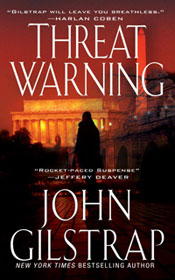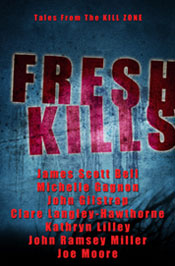Without further ado, please welcome John Gilstrap.
What is/was the most important step in getting yourself established in the industry?
I feel very strongly that there's only one way to get established in this business, or in any other: and that's to produce high-quality product and to get it noticed by others. There are no shortcuts, at least none that I've found. Every book brings new fans to add to the fans earned in the previous book(s). Sooner or later, a critical mass is reached.
If there is only one book people can read of yours, what should it be?
The answer to this will always be the one that is about to come out. Every book holds a place in my heart, and every one of them represents my very best effort at the time I wrote it. I like to think that I get better at this game as I go along, but that's for other people to decide.
What is the biggest pitfall in the publishing industry that people should stay away from?
This answer is going to ruffle a lot of feathers, and it relates directly to Question One above. Budding writers need to understand that there truly are no short cuts, and that there are truly no grand conspiracies to keep them out of the publishing industry. There's a reason why so few people who want to be published ever are, and that is because it's all more difficult than it looks, and most people who put words on paper don't have much to say in the first place, and they don't say it very well.
New writers need to ask themselves what they want to get out
of their writing experience. If the answer is to leave a legacy for their
children, or to entertain their social group, then there's nothing wrong with
self-publishing. On the other hand, if the goal is to publish hundreds of
thousands of books, then they need to embrace the fact that self-publishing is
a fool's errand and a money pit.
Smart minds will disagree, and that's fine. But I've
been in this game for the better part of two decades, and from where I sit, the
vast majority of the do-it-yourself advice on the Internet is utter crap,
designed to make money off of those who are ostensibly being advised.
I only know of one way, and that is through foreign agents.
How do you get those? Either through your publisher or through your
domestic literary agent.
With more authors relying strictly on e-book sales for their success, what is the one thing that is being overlooked in the e-book industry that people should be focusing on?
The focus should always and forever be on quality.
Good quality writing, good quality production values, good quality
editing. Right now, the publishing world is like the Wild West.
There seem to be few rules, and many of the old ones are being broken.
At the end of the day, though, the one thing that everyone will
want—whether in an ebook or in its paper cousin—is a good story well-told.
My crystal ball is no clearer than anyone else's, but I do
predict that the flood of really bad writing that is being hawked as ebooks is
ultimately going to ruin the ebook market as we now know it. In three to
five years (less?), readers are going to look more and more for the validation
of a publisher's imprint.
With the declining sales of print books, what do you feel needs to be done to resurrect this portion of the industry? At this point, can it come back?
Actually, the hardcover market is still thriving, and the
trade paper market is doing pretty well, too, considering. I think that
the mass market paperback is a dying breed, however. But it's too soon to
count anyone out. Business is a resilient thing, and I have every faith
that there'll be some combination of packaging and pricing that keeps the
traditional print book in existence.
When editing, how do you separate yourself from the book to make it better when your editor gives you constructive criticism you may not agree with?
I turn in pretty clean copy because I self-edit compulsively
and extensively throughout the entire writing cycle. I make a deal
with each of my editors at the very beginning: I ask them to be brutally honest
about what does not work for them and why, but then I want them to leave the
fixes to me. If I need help on the creativity side to fix the problem,
then I will ask for it. That's a system that has worked very well for me
over the years. I've never had a serious disagreement with an editor.
What has been the best way to promote your work (knowing that success is different for each individual)?
I believe with all my heart that there's only one way for an
author to have any significant impact in promotion or sales, and that is to
write good books. One per year, minimum. Readers will find good-quality
product sooner or later. Advertising, blogging, Facebooking, and all the
rest don't hurt, but I don't think it does much to move the needle. Most
book trailers I've seen are so awful that I think they do harm to the authors
who created them.
Again, there are no shortcuts. It's all about the
writing, which is all about the reader. Concentrate on the stories and
the characters, and the rest will come. And remember the old saw that
nothing destroys a bad product more quickly than good promotion.
What would you suggest bookstores do to stay with the changing industry? Would your answer be different for chains vs. local?
I think the chains need to find a way to market and
distribute ebooks. We need to get people into stores to see the covers
and to shop around. I don't know how to accomplish it, but I think that
if they don't brick-and-mortar stores will quickly become things of the
past.
What sets you apart in a sea of competition?
I write thrillers that have a big heart. My characters
seem real to my readers—or so they tell me. My protagonists are all
people I wish I could be. They have strong moral centers, and they work
hard to do the right thing--even if that means killing the bad guy.
What is the best piece of advice you were ever given?
No one can inflict failure upon another person; it has to be
declared by the individual. There's always an option not to give up.
Unless and until you do, the future is all about hope.
Now it's your turn! I'd love to hear what you think about his answers. Did you take anything away from this post that you can turn around and use in your career? With all of John's experience, I hope that is a resounding 'YES'. If not, what did you disagree with? Send us your feedback.
Again, thank you John for taking the time and answering these questions in the hopes to provide authors with poignant, timely industry information. You can email him or find him on Facebook.
Again, thank you John for taking the time and answering these questions in the hopes to provide authors with poignant, timely industry information. You can email him or find him on Facebook.




Excellent advice & nice to read another perspective - thank you! - Ashley L. Knight
ReplyDelete